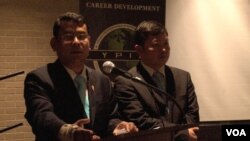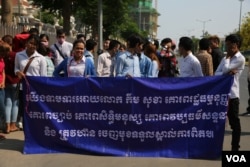Political intimidation, the suppression of political expression, and restrictions on freedom of assembly have Cambodia's young democracy under threat, observers in the country say.
Government officials say limitations on freedom are necessary to avoid a catastrophic "color revolution" of the sort that erupted in Syria five years ago. That uprising, which began amid hopes of a democratic spring across the Arab world, plunged the country into chaos.
Prime Minister Hun Sen argues that he is defending Cambodia's "hard-earned peace and political stability," said Preap Kol, executive director of Transparency International Cambodia.
The government insists its actions are legal, but differences in the treatment of pro- and anti-government demonstrators by authorities, and a series of prosecutions that appear politically motivated, raise questions of a double standard.
"There is a lack of fairness and social justice that is an important standard of rule of law," said Kol, who compared recent developments for Cambodian democracy to the choreography of a traditional Khmer dance. "Dancers take three steps forward and three steps backward. It goes forward slowly. In some circumstances, it retreats back swiftly."
Crackdown
The recent round of measures apparently designed to silence Hun Sen's opponents began last August when opposition senator Hong Sok Hour was arrested for allegedly falsifying public documents related to the 1979 Cambodia-Vietnam border treaty, despite his parliamentary immunity.
The crackdown turned violent in October when two Cambodia National Rescue Party (CNRP) lawmakers, Nhay Chamroeun and Kong Saphea, were badly beaten outside the National Assembly by youths — apparently aligned with the ruling party — who were granted relatively broad freedom to demonstrate. The protesters were demanding that the opposition party's deputy leader, Kem Sokha, be stripped of the parliament's vice presidency. The official investigation into the attack has become mired in the courts.
Intimidation peaked in January 2016, when charges were leveled against CNRP President Sam Rainsy, including a charge relating to one of Hong Sok Hour's allegedly faked documents, which, police say, Rainsy shared on Facebook. A defamation suit against Rainsy, filed years earlier by former Foreign Minister Hor Nam Hong, was swiftly reactivated just as a new defamation case was brought against him by National Assembly President Heng Samrin, forcing Rainsy back into exile for the fourth time.
CNRP lawmaker Um Sam An was arrested in April, also over comments about the Cambodian-Vietnamese border. Again, parliamentary immunity was circumvented by arguments that he was caught violating national laws. He was denied bail and remains in jail.
Sex scandal
Since April, the same youth activists aligned with the ruling Cambodian People's Party have demanded that the opposition deputy Sokha face legal consequences for an alleged affair that was purportedly exposed in recordings published online.
Political analysts, civil society organizations and even a United Nations employee have been caught up in the scandal. Some are accused of coercing the alleged mistress to publicly deny the claims. Sokha, in response, has stuck to his proclaimed philosophy of "no answer, no response, no argument," determined to surrender himself to the courts rather than choose self-exile.
The United Nations human rights agency has called the actions "politically-motivated persecution" and pointed to "woefully flawed due process" in the cases. The defamation suits against opposition lawmakers and the arrests of workers for local human rights group Adhoc were breaches "of the universal right to freedom of expression and opinion," the agency said.
Council of Ministers spokesman Phay Siphan asserted that the government was committed to the rule of law, and said recent moves to make officials responsive to the public through social media were, in fact, improving freedom of expression.
"It is the balance between the use of rights and the monitoring of [people's] rights by authorities in a democratic society," he said.
‘Tense’ political situation
But the government's recent actions have made the political situation "tense," said Chak Sopheap, executive director of the Cambodian Center for Human Rights. "It is a sign of threats to other NGOs that have been working on similar issues to foster respect for human rights in Cambodia."
Sopheap noted the vast quantity of government officials' time being dedicated to the sex scandal and the broader crackdown. The government and civil society groups seemed to be speaking different languages, interpreting the concepts of rule of law and freedom of expression entirely differently, she added.
"No one is opposing what the government says about peace and development," she said. "In fact, civil society is joining with the government to improve democracy and rule of law."
This report was produced in collaboration with VOA's Khmer Service.






